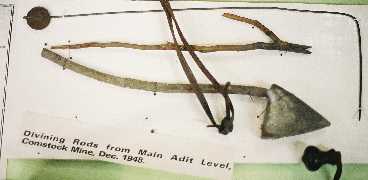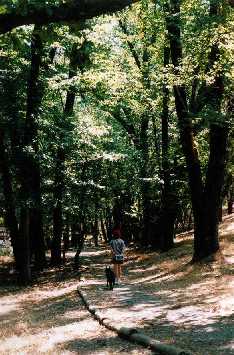From R.W. Raymond in a paper contained in the transactions of
the American Institute of Mining Engineers, 1883, and in United
States Geological Survey Mineral Resources, 1882, wrote of
divining, diviners and divining rods as follows:
|
|

| |
Divining rods dug out of an abandoned mine and
exhibited at Zeehan Mining Museum in Tasmania.
|
|
"The Scythians, Persians, and Medes used them. Herodotus
says that the Scythians detected perjurers by means of rods.
The word rhabdomancy, originated by the Greeks, shows
that they practiced this art; and the magic power of
Minerva, Circe, and Hermes or Mercury is familiar to classical
students. The lituus of the Romans, with which the augurs
divined, was apparently an arched rod. Cicero who had
himself been an augur says, in his treatise on divination,
that he does not see how two augurs, meeting in the street,
could look each other in the face without laughing. At
the end of the first book of this treatise he quotes a couplet
from the old Latin poet Ennius, representing a person from whom
a diviner had demanded a fee as replying to this demand
'I will pay you out of the treasures which you enable me
to find.'
Marco Polo reports the use of rods or arrows for divination
throughout the Orient, and a later traveller describes it among the
Turks. Tacitus says that the ancient Germans used for this purpose
branches of fruit trees. One of their tribes, the Frisians, employed
rods in church to detect murderers. Finally, if we may trust Gonzalez
de Mendoza, the Chinese, who seem to have had everything before
anybody else, used pieces of wood for divination."
"There is no body of evidence, so far as the writer is aware, so
valuable for assessing the claims of divining as that which has been
gathered and recorded by the Water Conservation and Irrigation
Commission of New South Wales in connection with the shallow drilling
carried out for settlers in central New South Wales. The drills
are operated by the Commission, and the drill foreman has to report
at the outset of the work whether or not the site has been divined.
The settlers are not influenced in any way in the fixing of bore
sites, and some of them have made their own selection, while others
have taken the advice of diviners. From these reports the Commission
has compiled the following table, which deals with all the boreholes
drilled between 1918 and the end of 1943."
| Classification of Boreholes
| Divined
| Not divined
|
Number
Drilled
| Percent
| Number
Drilled
| Percent
|
| Bores in which supplies of serviceable water, estimated at
100 gall. per hour (approx. 0.12 L/sec) or over, were obtained
| 1284
| 70.5
| 474
| 83.8
|
| Bores in which supplies of serviceable water, estimated at
less than 100 gall. per hour, were obtained
| 184
| 10.1
| 93
| 5.3
|
| Bores in which supplies of unserviceable water were
obtained
| 87
| 4.7
| 60
| 3.5
|
| Bores which were absolute failures, no water of any kind
being obtained
| 268
| 14.7
| 131
| 7.4
|
The districts within which these boreholes were drilled
have a yearly rainfall ranging from nearly 30in. (app. 750mm) to under
15in. (app. 375mm) in the extreme west.
The northern part of the area embracing the boreholes lies largely
within the Great Artesian Basin, with a consequent material reduction
in the risk of failure. Yet it will be seen that the proportion of
failures at divined sites is nearly double that at sites not divined,
while the percentage of highly successful drillings is far greater at
sites not divined than that at the divined sites. The very large
number of boreholes embraced in the tabulation corrects the deficiency
that has been felt by those who have tried to discuss divining in
the light of the records dealing with a small number of cases,
some of which may have been selected, and omitting any reference to
the failures that must certainly have occurred."
|

